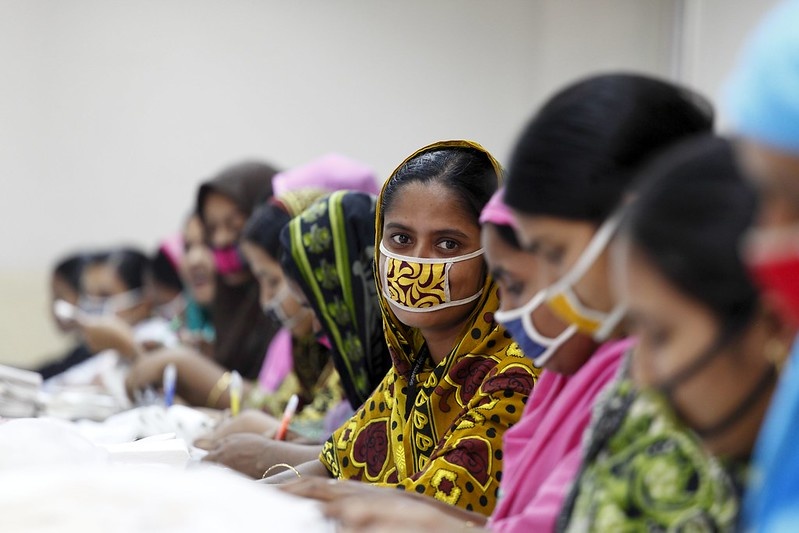5 May, 2022The majority of workers in the sector are women in low-paid jobs. IndustriALL is launching the third and final chapter of the research on gender-based violence and harassment with a summary of the results from the garment sector, where women report that trade union presence in the workplace makes a difference in fighting gender-based violence.
An estimated 80 per cent of workers in the textile and garment sector are women, who mainly work in lower paid machine and stitching jobs. Women are often fired when they become pregnant or if they report sexual harassment.
The women union leaders interviewed gave accounts of pervasive sexual harassment and abuse in their factories from supervisors, managers and male machine technicians. Women workers face regular incidents of inappropriate touching, sexualized gestures, verbal abuse and sexual favours.
“Many times if you want to get your contract extended the supervisor will ask sexual favours, it is difficult for women to say no as they want to keep their job…When the machine has a breakdown and the technician comes and touches them, they can’t say no as they want the machine repaired as they have to get their work done and they accept this,”
says a union representative in Indonesia.
There is a strong link between heightened risks of GBVH when workers face employment insecurity because of short-term contracts, poor working conditions, a lack of living wages, lack of social protection and being unable to exercise their right to organise and bargain collectively. Unattainable productivity bonuses and unfair piece work systems add to women’s vulnerability to violence and harassment.
Living wages, decent work and ending precarious work are of critical importance in to ending GBVH in the garment and textile sector. In addition, strategies to relieve production pressures and ensure women are not forced to work overtime, are essential in ending GBVH.
A lack of effective systems for reporting violence and harassment, along with a culture of silence, impunity and victim-blaming, contribute to low levels of complaints.
"I was subject to [sexual assault] in the lift at work, when I made a complaint I was laid off by the head of division, when I complained to the administration they did nothing. I then complained to court and I am waiting for this to be resolved…I have physical problems muscle and leg pain, and psychological problems,"
says a union representative from Morocco.
Many of the women interviewed spoke about the positive impact of a union; some women saw significant changes after the union was formed in the factory. Many unions have made training and awareness raising on GBVH a priority, along with workplace negotiations and agreements on the issue. The presence of women in trade union leadership positions has a defining impact.
The interviews also show the importance of confidential complaints systems that women trust and trade union representatives who can report incidents anonymously on behalf of a worker.
Further recommendations from women leaders interviewed include:
- Training and awareness raising for all workers and senior trade union leaders, senior and line managers on GBVH and complaint mechanisms
- More training and guidance on gender-responsive collective bargaining
- Integration of GBVH in occupational health and safety and the development of processes for gender-responsive risk assessment
- Awareness raising and training for union leaders, union representatives and managers on domestic violence
- Increase awareness of and strategies on the inclusion and recognition of the rights LGBTQI+ workers
IndustriALL textile and garment director Christina Hajagos-Clausen says:
“We know that gender-based violence in the workplace exists and it is unacceptable. This research shows the importance of union participation when addressing the issue and and finding solutions.”
For this chapter, individual and group interviews were carried out with 26 women union leaders and representatives in El Salvador (FEASIES), Indonesia (GARTEKS and SPN), Lesotho (IDU) and Turkey (Deriteks, DISK/TEKSTIL, Öz Iplik-Is and TEKSIF). The chapter also references some of the findings of a parallel research involving 27 women union leaders in Bangladesh (SGSF, BGIW and IBC) and Morocco (SNTHC-CDT, UMT).
Photo: Female workers Bangladesh, ©ILO
